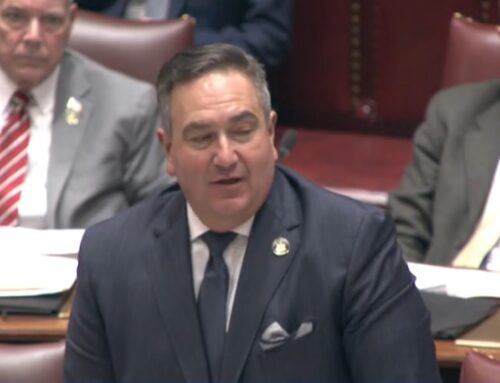Southern Chefs Take Meals to New Highs
April 18, 2025
|
Getting your Trinity Audio player ready…
|
This story is published as part of our partnership with The Food Section.
A convivial spirit guides the meals hosted by Infuso, the project of married Asheville-based chefs Griffin and Katherine Riffe. Their tasting menu dinners feature live music and playful elements, such as a comedy show or interactive projection art. They don’t include wine pairings, but their guests are nevertheless happy and chatty—and high.

A first course of potato-leek bisque comes infused with 2 milligrams of THC, the main component of cannabis that gives users a high, specially mixed to take effect almost as quickly as a cocktail. Further small doses of THC are blended into the salt sprinkled atop Caprese salad and the aioli for pommes frites, each dose paced to put the diner in an open but manageable headspace. The night might close with a chocolate pot de creme containing 10 milligrams of CBD, another cannabis chemical regarded as calming and grounding.
“It’s a culinary herb that just happens to make you feel really good when you eat it or smoke it,” Griffin Riffe says of cannabis. “We’re going to keep viewing it as that.”
Southern chefs are just now starting to explore the possibilities of cannabis, thanks to recent legal changes that freed them to cook openly with the plant. But state governments throughout the region are cracking down in ways that may keep this culinary art from flourishing.
People have likely been eating cannabis for as long as they’ve been cultivating it. Skilled cooks on the Indian subcontinent have prepared bhang, a paste of ground cannabis leaves incorporated into sweets, chutneys, and drinks, for at least 3,000 years. In the American South, where marijuana has been illegal for recreational use since the 1930s, home cooks have surreptitiously worked the plant into baked goods like “special brownies.”
Since 2018, more sophisticated forms of cannabis cooking have emerged across the region. That year’s federal farm bill legalized hemp, defined as any cannabis containing less than 0.3 percent THC. (Marijuana contains more than 0.3 percent of the chemical.)
Southeastern growers soon started producing hemp plants with much higher percentages of the legal chemical THCA, which converts into THC when smoked or heated. And creative chefs like the Riffes realized they could process and cook with the plant in ways that adhered to the letter of the law while achieving marijuana-like effects.

“We want to keep people hovering just above baseline, allowing the cannabinoids to act as the replacement for the social lubricant of alcohol,” says Griffin Riffe. “We want it to be a fun experience, where people are not trapped inside their heads.”
The Southeast itself, operating under hemp’s farm bill exemption, is unusual nationally—places where recreational marijuana is legal, like California and Colorado, don’t allow food to be infused and consumed onsite. Yet the region’s cannabis cooking movement is still in its early stages, emphasizes Asheville food writer Stu Helm, a veteran cannabis aficionado who recently launched Asheville Cannabis Tours. Prior to 2018, he explains, edible cannabis was something shared between friends, usually in dessert preparations designed for potency rather than culinary greatness.


Even in today’s legal market, Helm continues, most edibles come in the form of candies, chocolates, and brownies, prepackaged for consumption at home. Local craft in that space is evolving; he’s a fan of the handmade candy, including “Buddah Brittle” toffee and “Smacker Jacks” caramel popcorn at Asheville’s Skyland Cannabis Co., as well as Shane Casto’s double-fudge brownie for the Apotheca chain of dispensaries.
But most retail edibles are still produced industrially by large cannabis companies. “They’re always trying to cover up that earthy flavor with sugar and artificial flavors,” Helm says.
The Riffes, by contrast, see cannabis’ untapped potential for both savory and sweet cooking. Each strain has its own profile of aromatic compounds called terpenes, much like different cultivars of mint might have secondary notes of ginger or strawberry. Katherine cites a strain called Girl Scout Cookies that accentuates chocolate, while Griffin waxes poetic about GMO cannabis—an acronym for Garlic, Mushroom, and Onions, not genetically modified organism—adding depth to truffle pasta.
“You’re pulling that garlic; you’re pulling more mushroom; you’re pulling the onion out of essentially thin air. It’s kind of alchemy,” he says. “And if those ingredients are already in the food, you’re complementing each of those flavors individually.”
As the South gets to know cannabis, says Mike “Oz” Osborne, there will be more opportunities for chefs like him to take that kind of nuanced culinary approach to the plant. He’s working with Matt Minks at Emerald Heart in Murfreesboro, Tennessee, to open a cannabis-infused cafe inside of Minks’ dispensary in early May.
Many consumers grow attached to smoking a particular cannabis strain because of its distinctive flavors, Osborne says, and are enthusiastic for a menu that highlights those varieties. He imagines the Blueberry Cheesecake strain’s vanilla notes complementing a cream sauce over a fruit-based dessert, or GMO making an extra-hearty marinara for dipping focaccia. “We need to take advantage of what the customer already knows and what they already know they like,” he says.
Osborne’s plan to serve cannabis cooking from a dedicated restaurant makes him an outlier in the Southeast; the region’s only other comparable establishment is Buds & Brews, which has three locations across Nashville and Memphis. A few other storefronts offer packaged options, such as whoopie pies from Wake-N-Bakery in Raleigh, one location of a Chicago-based chain, and infused pizzas from Libretto’s Pizzeria in Charlotte, but made-to-order food is rare.
Much of the cannabis experimentation in the Southeast is instead happening at pop-up dinners or private events, like those offered by the Riffes. The prevailing model is similar to what’s employed by chefs exploring infused cuisine in states with legal marijuana, like Christopher “The Herbal Chef” Sayegh’s “Secret Supper Club” in Los Angeles or Chris “The Pizza Pusha” Barrett’s reservation-only Stoned Pizza in New York City.

Among those private chefs is Heath Scott of the Cannabis Catering Lab in Mount Juliet, a suburb of Nashville. Scott started his business offering cannabis-infused dinners to musicians, using connections he’d made over a 15-year career in publicity, and has since found success catering area bachelor and bachelorette parties. Most of those customers aren’t veteran cannabis consumers, so he focuses on curating the arc of the experience.
Like the Riffes, Scott generally discourages drinking at his dinners (alcohol can intensify the effects of cannabis, a phenomenon called “crossfading”), and he begins with a beverage or dip containing fast-absorbing THC to get guests relaxed quickly. Each guest also receives a small bag of CBD powder, which he claims can help bring down an uncomfortable high when mixed into water and drunk quickly.
Given his less-experienced clientele, Scott says he doesn’t have to worry about diners seeking familiar notes of Banana Breath or London Pound Cake. He uses infused butter and coconut oil, ingredients that can be subtly mixed into any cuisines his clients want. While he’s proud of his Southern cooking–he says he makes a mean pulled pork–he provides the cannabis for other chefs when diners want something outside of his comfort zone.
“My hillbilly ass comes in there trying to cook sushi—it’s not the same!” Scott says with a laugh.
Yet the biggest challenge for cannabis chefs is an uncertain legal landscape. Although the federal farm bill language that legalized hemp-derived cannabinoids remains in place, states have been tightening their own rules. South Carolina explicitly banned the use of CBD and THC in food for sale in early 2024, while Georgia banned all hemp-containing food products as of July.
State legislatures in Tennessee and North Carolina are also considering new laws that could greatly restrict cannabis cuisine. The former bill would ban THCA, the now-legal chemical that becomes THC when cooked; the latter, while still allowing THCA, would establish extensive licensing and testing requirements for those who “compound, blend, extract, infuse, cook, or otherwise manipulate hemp.”

Attorney Rod Kight, an Asheville-based expert on cannabis law, says North Carolina’s proposal is meant to crack down on home-based cannabis businesses while preserving the economic momentum (and tax revenue) of a market that generated $760 million in 2023 alone. He believes the rules are likely to pass and will discourage chefs from offering private dinner parties and made-to-order infusions.
The Riffes declined to comment on how new legislation might impact their business, but they’re expecting a big year ahead. Infuso is developing an infused pie for Asheville Pizza South, planning a Tolkien-inspired “Second Breakfast Club” on the cannabis holiday of April 20, and partnering on VIP dining options for a local music festival.
Meanwhile, they continue to make guests happy through private meals, including one couple’s recent anniversary celebration. Many romantic dinners include sweet potato gnocchi. Only the Riffes would top it with Super Lemon Haze butter cream sauce and balsamic hashish caviar.
Daniel Walton is an Asheville-based freelance reporter covering science, sustainability, and political news. He was previously the news editor of Mountain Xpress and has written for The Guardian, Civil Eats, and Sierra. Contact him at danielwwalton@live.com.
Search
RECENT PRESS RELEASES
Related Post




